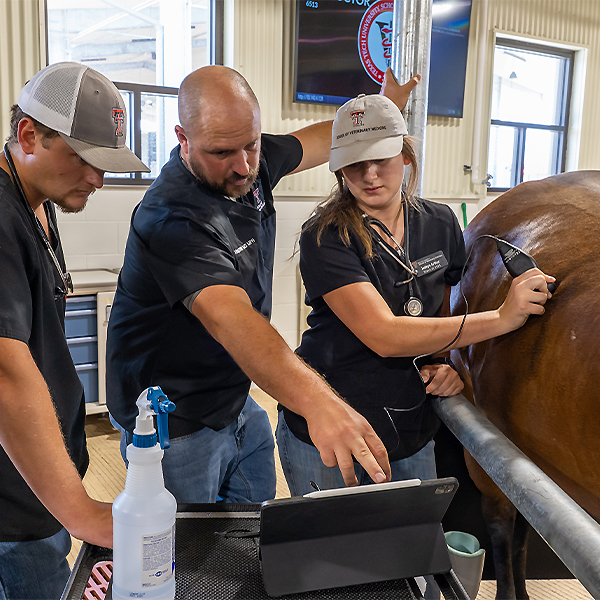
Fourth-year student Jadeyn Arthur is returning to a rural community to provide veterinary care.
In August 2021, Jadeyn Arthur stepped onto Texas Tech University’s School of Veterinary Medicine’s brand-new campus as part of the inaugural class. Through four years of grit and determination, she graduates next week with 60 other pioneering students ready to serve the veterinary needs of rural and regional communities.
Arthur is originally from Ralls, Texas, a rural community about 30 miles east of Lubbock. It’s a community rooted in agriculture.
“For generations, we’ve produced cotton, sorghum and wheat,” Arthur said. “My family has been working the same flat, treeless farmland that some might overlook, but to me, it’s home. I worked in the same fields my grandparents once did, attended the same high school as my dad, and grew up with a deep appreciation for the land and the people who depend on it.”
She also grew up surrounded by animals. In fact, through 4-H and the National FFA Organization, she had the opportunity to raise and show livestock. It was through those experiences she began to realize that veterinary medicine might just be in her future.
“I remember friends from town coming over for sleepovers, only to be roped into evening chores,” Arthur said. “They always commented on how lucky I was to have so many animals, and they were right. I was lucky – lucky to grow up on a farm, lucky to learn the value of hard work and lucky that those early experiences helped me discover my passion.”
Growing up on a farm in a small town with animals opened her eyes to a true need for veterinarians in rural communities.
“I saw the challenges rural communities face when it comes to veterinary care,” Arthur said. “There is no veterinarian in Ralls. In fact, there isn’t a clinic in the entire county or in many of the surrounding counties. I witnessed firsthand the impact this has on both pet owners and livestock producers. Routine care is hard to come by, and emergency care is often out of reach.”
Her love for animals, people and rural communities ignited a passion for her to one day bring much-needed veterinary care to rural and regional communities of Texas.
“These communities need veterinarians who not only understand their lifestyle, but who are committed to serving them,” Arthur said. “That’s exactly the kind of veterinarian I want to be.”
Let’s get to know Arthur more through a series of questions.
What are you passionate about in veterinary medicine? 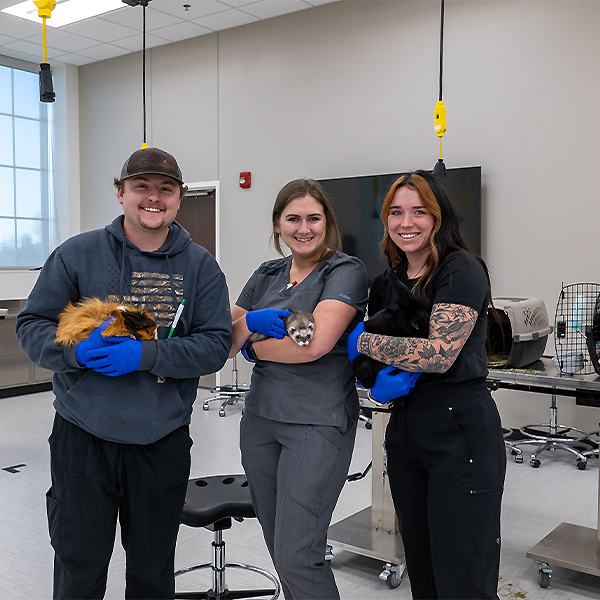
I love mixed animal practice because it guarantees that no two days will ever be the same. It keeps me engaged, challenged and learning. Throughout my fourth-year clinical training, I’ve come to admire many of our mixed animal practice partners for not just their knowledge, but for their versatility. I’ve watched some perform orthopedic procedures on a five-pound dog in the morning, then carry out a C-section on a cow that same evening. Their ability to move seamlessly between species and cases is incredible. Some of them truly can do it all and that’s the kind of veterinarian I aspire to be.
My particular interests lie in surgery and equine reproduction. These areas have really come into focus during my clinical year, where I’ve had the opportunity to gain hands-on experience and deepen my understanding. The more I learn, the more intrigued I become. One of the things I value most about mixed animal practice is it allows me to pursue these interests across a variety of species. Whether it’s an equine lameness, a small animal spay, or managing a dystocia in a goat, I find it incredibly rewarding to apply my skills in diverse, practical ways. I’m excited to continue developing as a clinician who can confidently meet the needs of both animals and their owners no matter the species, no matter the challenge.
What are some life experiences that led you to that passion? 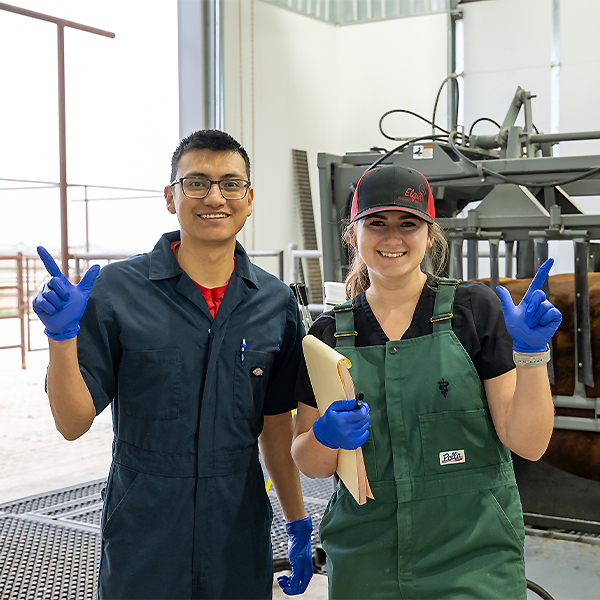
Growing up, even when we took our animals to the vet, it wasn’t always convenient to leave them there for treatment. The long drive back and forth meant that, more often than not, the treatments came home with us and who better to administer them than an aspiring veterinarian? I was more than happy to take on the responsibility. From a young age, I became the designated animal caretaker in our household.
We treated many of our animals ourselves. I remember applying eye ointments for corneal ulcers, giving antibiotics to pigs with pneumonia, and learning through trial and error how to bandage horses with banged up legs. Every case, big or small, was a chance to learn more about animal health and develop my skills.
These experiences sparked a genuine curiosity and gave me a real sense of purpose. I loved being hands-on, finding solutions and seeing the results of good care.
Looking back, those moments of treating animals in the barn with guidance from a veterinarian miles away planted the seeds of the career I have today. They taught me to be resourceful, attentive and compassionate, and they were some of my earliest steps on the path to becoming a veterinarian.
What inspired you to be a veterinarian?
From an early age, it was evident I had an abiding love for animals. Whether it was the livestock we raised for stock shows or the wild baby birds I eagerly tried to rescue, I felt compassion for every creature I encountered (well, maybe except snakes). My mother recognized this passion and encouraged it at every opportunity, allowing it to guide me toward my future.
She didn’t just support my dream – she fueled it. In middle school, she spent her summers driving me to veterinary clinics so I could shadow professionals and get hands-on experience. She signed me up for the 4-H vet science program and took me to more contests, camps and events than I can count. Through it all, she never once doubted that I would become a veterinarian.
Her encouragement and willingness to invest in my dream was all the inspiration I needed. I owe so much of my journey and my success to her.
How do you plan serve the veterinary needs of rural and regional communities after graduation?
After graduation, I will be joining Brock Veterinary Clinic in Lamesa, Texas. This opportunity holds a special meaning for me. When I was 13 years old, I watched my first colic surgery happen on my own mare at this very clinic. At the time, I never imagined that one day I would return as a veterinarian, working up colic cases myself in the same facility that first sparked my interest in equine surgery.
Brock Veterinary Clinic is a mixed animal practice that serves a broad region, stretching across multiple states. While they see a wide range of species, they are best known as an equine referral and surgical facility that plays a vital role in this area. They have built a reputation for excellence, especially in their commitment to rural and regional communities.
The team is composed of highly skilled veterinarians who not only bring a wealth of knowledge and experience but who also go above and beyond in providing care during regular hours, being one of the few clinics in the area that handles after-hours large animal emergencies.
I am excited to be joining such a dedicated team. It feels like I’ve come full circle.
Why did you choose Texas Tech?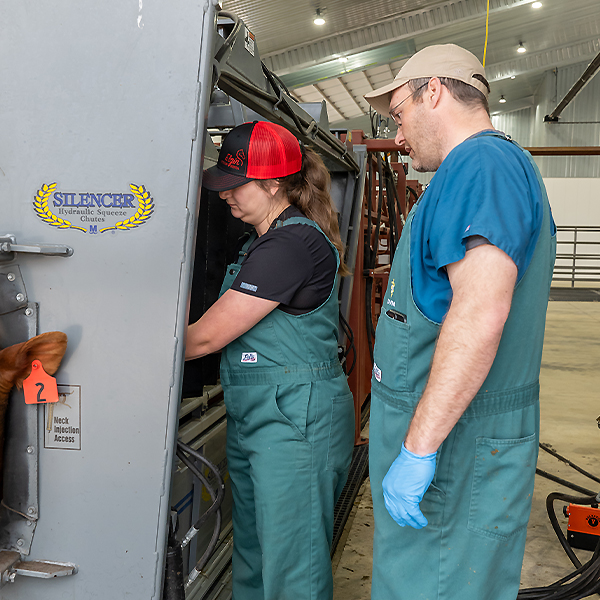
The first time I toured the Texas Tech School of Veterinary Medicine, I was required to wear a hard hat as it was still an active construction site. We stepped into what is now ASCO Hall, which at the time was just a concrete shell filled with construction equipment, but more importantly it was filled with vision. The original team of faculty and staff leading the tour spoke with such confidence in what they were building that I couldn’t help but believe in it too. In that moment, I knew I wanted to be part of it. They weren’t just constructing a school. They were building a legacy.
Growing up in a rural area, I understood the purpose of this program on a personal level. Communities like mine, across Texas and New Mexico, face a serious need for veterinarians, especially those equipped with the practical skills to serve rural populations. Over the past four years, this program has provided me with those tools. The distributive model has exceeded my expectations in every way. It has allowed me to build confidence in my clinical skills, communication and medical knowledge. More importantly, it has shown me the difference a veterinarian can make in a community.
How are you involved with the school?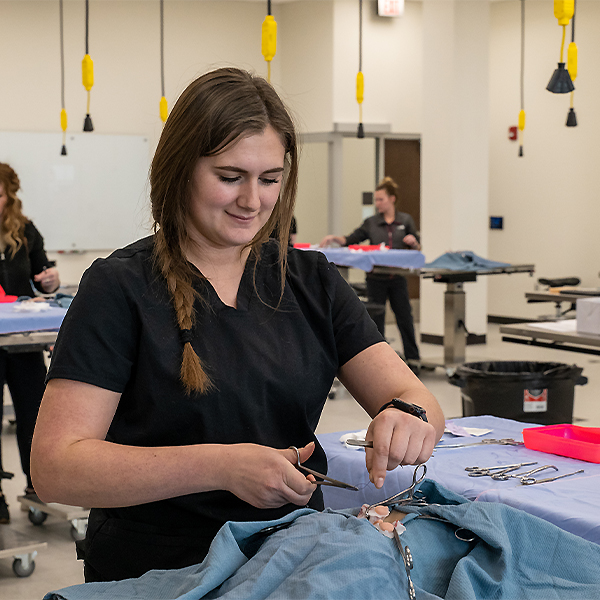
Being part of the inaugural class has certainly come with its perks but it has also presented some challenges. Without an established roadmap, we were responsible for creating many of the programs, traditions and opportunities that future classes will build upon. We had to form our own student organizations, initiate our own community outreach efforts and shape the culture of our school from the ground up.
I was proud to serve as the secretary for the very first Student Chapter of the American Association of Equine Practitioners (SCAAEP) at Texas Tech University School of Veterinary Medicine. In that role, I helped lay the foundation for an organization that will benefit future equine-focused students for years to come.
Beyond leadership, I’ve been fortunate to take part in a wide range of outreach activities that reflect the school’s commitment to community. These include multiple vaccination clinics, helping the AniMeals program for Meals on Wheels of Amarillo, student interviews, school tours, and countless other events organized by the school. It has been a pleasure to give back to the community that has done so much for our program.
How has your clinical year experience been?
Integrity, grit, kindheartedness, community and inspiration are the foundational core values our school was built upon and are just as true today as they were on our very first day of school. Over the past year, I’ve seen these qualities come to life in our clinical partners, and I’ve come to understand how deeply they’re woven into the fabric of this profession. My clinical year has been the highlight of my veterinary education.
This past year, my journey has taken me as far north as Spearman, Texas, and as far south as Salado, Texas, with many stops in between. Most of my rotations were spent in the Panhandle and South Plains regions. What can I say – I love my roots, and I truly believe you won’t find better people in these parts of Texas. No matter the location, each practice I rotated through added to my knowledge and helped me grow. I was actively involved in diagnostic interpretation, surgical procedures, treatment planning, client communication, and even discussions on business management.
Although this was my final year of veterinary school, it brought many “firsts” for me. I saw my first CT scan of a horse, performed my first aural hematoma surgery on a dog, diagnosed my first case of lymphoma, and placed my first emergency tracheostomy tube in a horse, just to name a few. I shared one of these experiences with a clinical partner, and she said, “You’ll keep having firsts even after decades in practice.” That moment stuck with me. What an exciting, ever-evolving profession I am joining.
How have you felt the clinical year has prepared you to be a better veterinarian?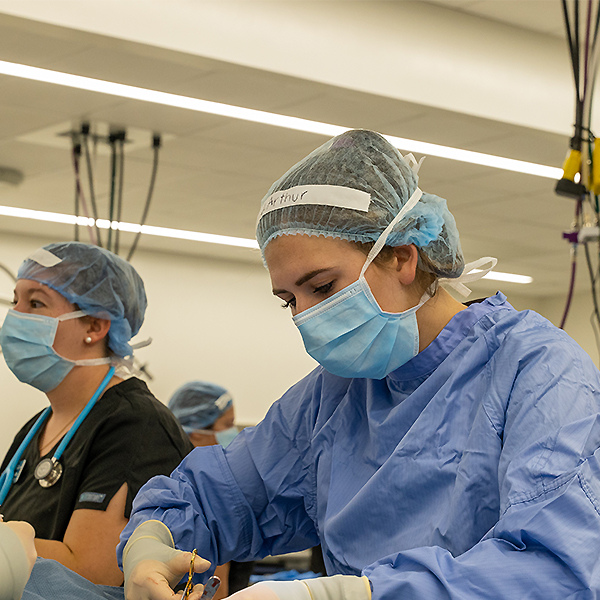
Over the past year, I’ve experienced tremendous personal and professional growth. I’ve strengthened not only my clinical and communication skills but also expanded my network of mentors and resources. Most of the veterinarians I worked with during my clinical year were managing full schedules every single day, which is a caseload that would be rare in a traditional teaching hospital setting. That level of exposure was invaluable. It allowed me to refine my medical knowledge while also gaining a deeper understanding of how practicing veterinarians successfully balance demanding workloads with family life, community involvement and professional development.
This year made it clear to me that veterinary medicine extends far beyond diagnostics and treatment plans. The title of “veterinarian” comes with the responsibility of being a teacher, a lifelong learner, a business partner, and a trusted leader within the community. Those are things you can’t fully grasp in a classroom. They have to be experienced. My clinical year has given me that experience. It has shaped not just the kind of veterinarian I am becoming, but the kind of person I aspire to be.
Can you talk about your excitement for graduation?
Walking across that stage, I know I’ll be part of something historic and something that hasn’t happened in the state of Texas in over a century. As the inaugural class of Texas Tech’s School of Veterinary Medicine, we’ve had the unique honor of creating new traditions over the past four years, and now, crossing that stage will be our final one. It’s hard not to feel excited. The entire community shares in that excitement along with our practice partners, our mentors, and everyone who helped bring this vision to life.
Becoming a veterinarian has always been my dream, but being part of the very first class makes it even more meaningful. This school exists because of the dedication, perseverance, and hard work of so many individuals over many years. I am proud to be a product of that legacy, and I am committed to fulfilling the mission of this program by serving the communities that need us most.
